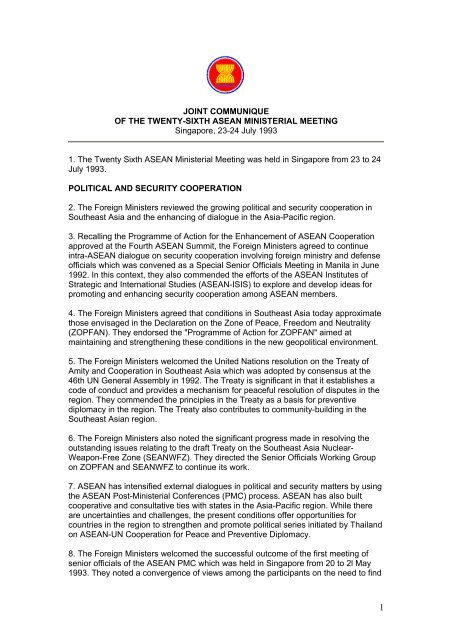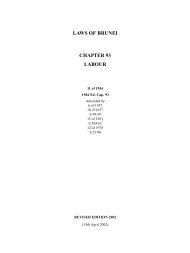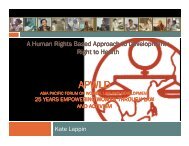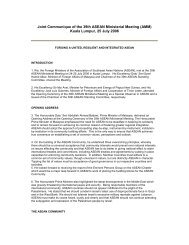Joint Communique of the 26th ASEAN Ministerial Meeting
Joint Communique of the 26th ASEAN Ministerial Meeting
Joint Communique of the 26th ASEAN Ministerial Meeting
Create successful ePaper yourself
Turn your PDF publications into a flip-book with our unique Google optimized e-Paper software.
JOINT COMMUNIQUE<br />
OF THE TWENTY-SIXTH <strong>ASEAN</strong> MINISTERIAL MEETING<br />
Singapore, 23-24 July 1993<br />
1. The Twenty Sixth <strong>ASEAN</strong> <strong>Ministerial</strong> <strong>Meeting</strong> was held in Singapore from 23 to 24<br />
July 1993.<br />
POLITICAL AND SECURITY COOPERATION<br />
2. The Foreign Ministers reviewed <strong>the</strong> growing political and security cooperation in<br />
Sou<strong>the</strong>ast Asia and <strong>the</strong> enhancing <strong>of</strong> dialogue in <strong>the</strong> Asia-Pacific region.<br />
3. Recalling <strong>the</strong> Programme <strong>of</strong> Action for <strong>the</strong> Enhancement <strong>of</strong> <strong>ASEAN</strong> Cooperation<br />
approved at <strong>the</strong> Fourth <strong>ASEAN</strong> Summit, <strong>the</strong> Foreign Ministers agreed to continue<br />
intra-<strong>ASEAN</strong> dialogue on security cooperation involving foreign ministry and defense<br />
<strong>of</strong>ficials which was convened as a Special Senior Officials <strong>Meeting</strong> in Manila in June<br />
1992. In this context, <strong>the</strong>y also commended <strong>the</strong> efforts <strong>of</strong> <strong>the</strong> <strong>ASEAN</strong> Institutes <strong>of</strong><br />
Strategic and International Studies (<strong>ASEAN</strong>-ISIS) to explore and develop ideas for<br />
promoting and enhancing security cooperation among <strong>ASEAN</strong> members.<br />
4. The Foreign Ministers agreed that conditions in Sou<strong>the</strong>ast Asia today approximate<br />
those envisaged in <strong>the</strong> Declaration on <strong>the</strong> Zone <strong>of</strong> Peace, Freedom and Neutrality<br />
(ZOPFAN). They endorsed <strong>the</strong> "Programme <strong>of</strong> Action for ZOPFAN" aimed at<br />
maintaining and streng<strong>the</strong>ning <strong>the</strong>se conditions in <strong>the</strong> new geopolitical environment.<br />
5. The Foreign Ministers welcomed <strong>the</strong> United Nations resolution on <strong>the</strong> Treaty <strong>of</strong><br />
Amity and Cooperation in Sou<strong>the</strong>ast Asia which was adopted by consensus at <strong>the</strong><br />
46th UN General Assembly in 1992. The Treaty is significant in that it establishes a<br />
code <strong>of</strong> conduct and provides a mechanism for peaceful resolution <strong>of</strong> disputes in <strong>the</strong><br />
region. They commended <strong>the</strong> principles in <strong>the</strong> Treaty as a basis for preventive<br />
diplomacy in <strong>the</strong> region. The Treaty also contributes to community-building in <strong>the</strong><br />
Sou<strong>the</strong>ast Asian region.<br />
6. The Foreign Ministers also noted <strong>the</strong> significant progress made in resolving <strong>the</strong><br />
outstanding issues relating to <strong>the</strong> draft Treaty on <strong>the</strong> Sou<strong>the</strong>ast Asia Nuclear-<br />
Weapon-Free Zone (SEANWFZ). They directed <strong>the</strong> Senior Officials Working Group<br />
on ZOPFAN and SEANWFZ to continue its work.<br />
7. <strong>ASEAN</strong> has intensified external dialogues in political and security matters by using<br />
<strong>the</strong> <strong>ASEAN</strong> Post-<strong>Ministerial</strong> Conferences (PMC) process. <strong>ASEAN</strong> has also built<br />
cooperative and consultative ties with states in <strong>the</strong> Asia-Pacific region. While <strong>the</strong>re<br />
are uncertainties and challenges, <strong>the</strong> present conditions <strong>of</strong>fer opportunities for<br />
countries in <strong>the</strong> region to streng<strong>the</strong>n and promote political series initiated by Thailand<br />
on <strong>ASEAN</strong>-UN Cooperation for Peace and Preventive Diplomacy.<br />
8. The Foreign Ministers welcomed <strong>the</strong> successful outcome <strong>of</strong> <strong>the</strong> first meeting <strong>of</strong><br />
senior <strong>of</strong>ficials <strong>of</strong> <strong>the</strong> <strong>ASEAN</strong> PMC which was held in Singapore from 20 to 2l May<br />
1993. They noted a convergence <strong>of</strong> views among <strong>the</strong> participants on <strong>the</strong> need to find<br />
1
ways to promote consultations on regional political and security issues. They<br />
endorsed <strong>the</strong> proposal <strong>of</strong> <strong>the</strong> senior <strong>of</strong>ficials to invite China, Laos, Papua New<br />
Guinea, Russia and Vietnam to meet <strong>ASEAN</strong> and its Dialogue Partners at <strong>the</strong><br />
"<strong>ASEAN</strong> Regional Forum" in Bangkok next week.<br />
9. The Foreign Ministers reaffirmed <strong>ASEAN</strong>'s commitment to <strong>the</strong> centrality <strong>of</strong> <strong>the</strong><br />
United Nations' role in <strong>the</strong> maintenance <strong>of</strong> international peace and security. They<br />
viewed <strong>the</strong> Secretary-General's "An Agenda for Peace" proposals as an innovative<br />
approach towards streng<strong>the</strong>ning <strong>the</strong> role <strong>of</strong> <strong>the</strong> United Nations in preventive<br />
diplomacy, peace-making, peace-keeping and peace-building. They welcomed <strong>the</strong><br />
Workshop series initiated by Thailand on <strong>ASEAN</strong>-UN Cooperation for Peace and<br />
Preventive Diplomacy.<br />
INTERNATIONAL AND REGIONAL SITUATION<br />
10. The Foreign Ministers had a wide-ranging exchange <strong>of</strong> views on current<br />
international and regional developments. They agreed that countries such as <strong>the</strong><br />
United States, China, Japan and Russia can contribute to regional security through<br />
<strong>the</strong> maintenance <strong>of</strong> stable relationships and <strong>the</strong> adoption <strong>of</strong> positive policies towards<br />
<strong>the</strong> region.<br />
11. The Foreign Ministers expressed <strong>the</strong> preparedness <strong>of</strong> <strong>the</strong> <strong>ASEAN</strong> Member<br />
Countries to work toge<strong>the</strong>r with <strong>the</strong> international community, multilateral institutions<br />
and <strong>the</strong> major powers to contribute to <strong>the</strong> reconstruction <strong>of</strong> Cambodia, Laos and<br />
Vietnam.<br />
12. The Foreign Ministers called for a faster pace <strong>of</strong> resettlement <strong>of</strong> lndochinese<br />
refugees and asylum-seekers. They also called for <strong>the</strong> expeditious repatriations <strong>of</strong><br />
those Vietnamese "screened-out" as non-refugees . In this context, <strong>the</strong>y welcomed<br />
Vietnam's commitment to <strong>the</strong> "Orderly Repatriation Programme" for Vietnamese boat<br />
people and appealed to <strong>the</strong> international community to finance <strong>the</strong> programme for<br />
Vietnamese boat people. They called on <strong>the</strong> resettlement countries to facilitate an<br />
early resolution <strong>of</strong> <strong>the</strong> problem.<br />
13. The Foreign Ministers reiterated <strong>the</strong> invitation to all parties directly concerned to<br />
subscribe to <strong>the</strong> principles <strong>of</strong> <strong>the</strong> <strong>ASEAN</strong> Declaration on <strong>the</strong> South China Sea. They<br />
noted that <strong>the</strong> Workshop series on Managing Potential Conflicts in <strong>the</strong> South China<br />
Sea initiated by Indonesia, and <strong>the</strong> working Group meetings held within <strong>the</strong><br />
framework <strong>of</strong> <strong>the</strong> Workshop, had promoted understanding among <strong>the</strong> countries<br />
concerned <strong>of</strong> <strong>the</strong> issues involved and provided ideas for future cooperation.<br />
14. The Foreign Ministers expressed <strong>the</strong>ir serious concern over <strong>the</strong> desperate<br />
situation in <strong>the</strong> Republic <strong>of</strong> Bosnia-Herzegovina, an independent and sovereign<br />
member state <strong>of</strong> <strong>the</strong> United Nations. They deplored <strong>the</strong> blatant aggression against<br />
Bosnia-Herzegovina by Serbian forces supported by <strong>the</strong> Yugoslav National Army and<br />
compounded by <strong>the</strong> recent attacks by Croat extremist elements. They called on <strong>the</strong><br />
UN Security Council to act decisively to halt <strong>the</strong> Serbian aggression, reverse it<br />
through withdrawals from all territories occupied by <strong>the</strong> use <strong>of</strong> force, "ethnic<br />
cleansing" or by any o<strong>the</strong>r means, and fully restore <strong>the</strong> sovereignty, unity and<br />
territorial integrity <strong>of</strong> Bosnia-Herzegovina. The Government <strong>of</strong> Bosnia-Herzegovina<br />
should also be exempted from <strong>the</strong> application <strong>of</strong> UNSC Resolution 713 (1991)<br />
imposing an arms embargo against <strong>the</strong> former Yugoslavia.<br />
15. The Foreign Ministers welcomed lndonesia's assumption <strong>of</strong> <strong>the</strong> Chairmanship <strong>of</strong><br />
<strong>the</strong> Non-Aligned Movement since <strong>the</strong> Tenth Summit <strong>Meeting</strong> <strong>of</strong> <strong>the</strong> Non-Aligned<br />
2
Countries held in Jakarta in September 1992. They also noted with appreciation <strong>the</strong><br />
recent meeting held between Indonesia, as Chairman <strong>of</strong> <strong>the</strong> Non-Aligned Movement,<br />
and <strong>the</strong> G-7 through Japan as its Chairman, on which occasion <strong>the</strong> NAM Chairman<br />
conveyed <strong>the</strong> Movement's aspirations, new orientations and approaches, and<br />
specifically invited <strong>the</strong> developed countries <strong>of</strong> <strong>the</strong> North to enter into a constructive<br />
dialogue with countries <strong>of</strong> <strong>the</strong> South on <strong>the</strong> basis <strong>of</strong> mutuality <strong>of</strong> interests and <strong>of</strong><br />
benefits and equitably shared responsibility. They were encouraged by <strong>the</strong> response<br />
<strong>of</strong> <strong>the</strong> G-7 to <strong>the</strong> NAM's invitation to a dialogue and hoped that it would signal and<br />
lead to a mutually beneficial pattern <strong>of</strong> cooperation between <strong>the</strong> developed and <strong>the</strong><br />
developing countries in this era <strong>of</strong> growing interdependence and globalization in <strong>the</strong><br />
world economy.<br />
HUMAN RIGHTS<br />
16. The Foreign Ministers welcomed <strong>the</strong> international consensus achieved during <strong>the</strong><br />
World Conference on Human Rights in Vienna, 14-25 June 1993, and reaffirmed<br />
<strong>ASEAN</strong>'s commitment to and respect for human rights and fundamental freedoms as<br />
set out in <strong>the</strong> Vienna Declaration <strong>of</strong> 25 June 1993. They stressed that human rights<br />
are interrelated and indivisible comprising civil, political, economic, social and cultural<br />
rights. These rights are <strong>of</strong> equal importance. They should be addressed in a<br />
balanced and integrated manner and protected and promoted with due regard for<br />
specific cultural, social, economic and political circumstances. They emphasized that<br />
<strong>the</strong> promotion and protection <strong>of</strong> human rights should not be politicized.<br />
17. The Foreign Ministers agreed that <strong>ASEAN</strong> should coordinate a common<br />
approach on human rights and actively participate and contribute to <strong>the</strong> application,<br />
promotion and protection <strong>of</strong> human rights. They noted that <strong>the</strong> UN Charter had<br />
placed <strong>the</strong> question <strong>of</strong> universal observance and promotion <strong>of</strong> human rights within<br />
<strong>the</strong> context <strong>of</strong> international cooperation. They stressed that development is an<br />
inalienable right and that <strong>the</strong> use <strong>of</strong> human rights as a conditionality for economic<br />
cooperation and development assistance is detrimental to international cooperation<br />
and could undermine an international consensus on human rights. They emphasized<br />
that <strong>the</strong> protection and promotion <strong>of</strong> human rights in <strong>the</strong> international community<br />
should take cognizance <strong>of</strong> <strong>the</strong> principles <strong>of</strong> respect for national sovereignty, territorial<br />
integrity and non-interference in <strong>the</strong> internal affairs <strong>of</strong> states. They were convinced<br />
that freedom, progress and national stability are promoted by a balance between <strong>the</strong><br />
rights <strong>of</strong> <strong>the</strong> individual and those <strong>of</strong> <strong>the</strong> community, through which many individual<br />
rights are realized, as provided for in <strong>the</strong> Universal Declaration <strong>of</strong> Human Rights.<br />
18. The Foreign Ministers reviewed with satisfaction <strong>the</strong> considerable and continuing<br />
progress <strong>of</strong> <strong>ASEAN</strong> in freeing its peoples from fear and want, enabling <strong>the</strong>m to live in<br />
dignity. They stressed that <strong>the</strong> violations <strong>of</strong> basic human rights must be redressed<br />
and should not be tolerated under any pretext. They fur<strong>the</strong>r stressed <strong>the</strong> importance<br />
<strong>of</strong> streng<strong>the</strong>ning international cooperation on all aspects <strong>of</strong> human rights and that all<br />
governments should uphold humane standards and respect human dignity. In this<br />
regard and in support <strong>of</strong> <strong>the</strong> Vienna Declaration and Programme <strong>of</strong> Action <strong>of</strong> 25 June<br />
1993 <strong>the</strong>y agreed that <strong>ASEAN</strong> should also consider <strong>the</strong> establishment <strong>of</strong> an<br />
appropriate regional mechanism on human rights.<br />
INTERNATIONAL ECONOMIC ISSUES<br />
19. The Foreign Ministers stressed <strong>the</strong> importance <strong>of</strong> trade and investment<br />
liberalization and increased world trade to secure sustained growth in <strong>the</strong> world<br />
economy.<br />
3
20. In reviewing <strong>the</strong> development <strong>of</strong> world trade, <strong>the</strong> Foreign Ministers expressed<br />
deep concern over <strong>the</strong> slow pace towards achieving agreement under <strong>the</strong> Uruguay<br />
Round. An early and successful conclusion <strong>of</strong> <strong>the</strong> Uruguay Round is necessary to<br />
revitalize on trade. The Foreign Ministers noted <strong>the</strong> renewed determination and<br />
commitment <strong>of</strong> <strong>the</strong> G-7 at <strong>the</strong>ir recent meeting in Tokyo to resolve <strong>the</strong> remaining<br />
difficult issues and to conclude <strong>the</strong> Uruguay Round. However greater efforts have to<br />
be made to multilateralize <strong>the</strong> process <strong>of</strong> negotiations. This requires strong politic<br />
commitment by all parties, particularly <strong>the</strong> major players, in resolving <strong>the</strong>ir differences<br />
in order to conclude <strong>the</strong> Uruguay Round with a balanced package by <strong>the</strong> end <strong>of</strong><br />
1993.<br />
21. On international economic trends, <strong>the</strong> Foreign Ministers noted a global shift<br />
towards regionalism in recent years. They stressed <strong>the</strong> need for regional groupings<br />
such as <strong>the</strong> European Community, North American Free Trade Agreement (NAFTA)<br />
and <strong>ASEAN</strong> Free Trade Area (AFTA) to remain open while seeking to expand intraregional<br />
trade. Regional trade groupings would complement GATT and contribute<br />
towards a faster and significant conclusion <strong>of</strong> <strong>the</strong> Uruguay Round.<br />
22. The Foreign Ministers endorsed <strong>the</strong> need protect and preserve <strong>the</strong> environment<br />
while sustain long-term economic growth. Developed nations and multilateral<br />
financial institutions need to implement <strong>the</strong> commitments made at <strong>the</strong> UN<br />
Conference Environment and Development held in Rio de Janeiro in June 1992 by<br />
granting new and additional financial resources and transferring environmentally<br />
sound technologies to <strong>the</strong> developing countries Environmental issues should not<br />
become a cover for protectionism that impeded legitimate trade.<br />
23. The Foreign Ministers emphasized that <strong>the</strong> right to development and economic<br />
well-being is a fundamental and inalienable right <strong>of</strong> all peoples. The emerging global<br />
economic order has to provide for more equal economic opportunities for all nations.<br />
They called upon industrialized nations and multilateral financial institutions to<br />
intensify <strong>the</strong>ir efforts in promoting foreign direct investments in developing countries,<br />
and to establish a genuinely open multilateral trading environment. They underscored<br />
<strong>the</strong> importance <strong>of</strong> peace and stability as a pre-condition for <strong>the</strong> successful<br />
implementation <strong>of</strong> policies for economic development and <strong>the</strong> eradication <strong>of</strong> poverty.<br />
<strong>ASEAN</strong> FREE TRADE AREA (AFTA)<br />
24. The Foreign Ministers welcomed <strong>the</strong> launching <strong>the</strong> Common Effective<br />
Preferential Tariff (CEPT) Scheme for AFTA on 1 January 1993. Operational details<br />
<strong>of</strong> <strong>the</strong> CEPT Scheme had been finalized; particular, lists <strong>of</strong> products with schedules<br />
<strong>of</strong> tariff reduction have been exchanged among all member countries and <strong>the</strong><br />
process <strong>of</strong> tariff reduction among member countries has begun. Various o<strong>the</strong>r<br />
initiative such as tariff reforms have also been undertaken <strong>ASEAN</strong> countries to<br />
complement and supplement trade liberalization towards attainment <strong>of</strong> <strong>the</strong> objectives<br />
<strong>of</strong> AFTA.<br />
25. The Foreign Ministers expressed <strong>the</strong> common desire to see <strong>the</strong> smooth and swift<br />
implementation AFTA to fur<strong>the</strong>r promote economic cooperation within <strong>ASEAN</strong> and to<br />
facilitate investments in <strong>ASEAN</strong> by third countries. They reaffirmed <strong>the</strong> importance<br />
implementing <strong>the</strong> CEPT Scheme within <strong>the</strong> time-frame agreed at <strong>the</strong> Fourth <strong>ASEAN</strong><br />
Summit. The realization AFTA would greatly streng<strong>the</strong>n <strong>ASEAN</strong>'s cohesiveness,<br />
dynamism and vitality as a regional organization. AFTA, as a GATT - consistent and<br />
outward-looking arrangement, would also contribute to <strong>the</strong> streng<strong>the</strong>ning <strong>of</strong> <strong>the</strong><br />
multilateral trading system.<br />
4
FUNCTIONAL COOPERATION<br />
26. The Foreign Ministers expressed satisfaction at <strong>the</strong> progress <strong>of</strong> <strong>ASEAN</strong><br />
cooperation in science and technology, environment, culture and information, social<br />
development, drugs and narcotics control and civil service matters. Cooperation in<br />
<strong>the</strong>se areas has become more sophisticated and taken a truly <strong>ASEAN</strong> character.<br />
Since <strong>the</strong> founding <strong>of</strong> <strong>ASEAN</strong>, functional cooperation has provided a firm foundation<br />
and a rallying point for common action towards streng<strong>the</strong>ning <strong>ASEAN</strong> solidarity and<br />
cooperation. Following <strong>the</strong> decisions <strong>of</strong> <strong>the</strong> Fourth <strong>ASEAN</strong> Summit, <strong>ASEAN</strong>developed<br />
technologies are being commercialized and transferred; strategies for <strong>the</strong><br />
implementation <strong>of</strong> Agenda 21 for environmentally sound and sustainable<br />
development are being formulated; <strong>the</strong> global thrusts and priorities in culture and<br />
information are being developed; increased participation <strong>of</strong> women in development is<br />
being promoted; and, <strong>the</strong> <strong>ASEAN</strong> Task Force on AIDS has been established and<br />
held its first meeting in Jakarta in March 1993.<br />
RESTRUCTURING OF THE <strong>ASEAN</strong> SECRETARIAT<br />
27. The Foreign Ministers welcomed <strong>the</strong> completion <strong>of</strong> <strong>the</strong> process <strong>of</strong> restructuring <strong>of</strong><br />
<strong>the</strong> <strong>ASEAN</strong> Secretariat and expressed confidence in <strong>the</strong> Secretariat's ability to carry<br />
out its expanded mandate as defined by <strong>the</strong> Fourth <strong>ASEAN</strong> Summit. The Twenty-<br />
Sixth <strong>ASEAN</strong> Standing Committee has taken steps to provide <strong>the</strong> necessary<br />
resources for <strong>the</strong> Secretariat to perform its functions effectively. With <strong>the</strong><br />
establishment <strong>of</strong> <strong>the</strong> <strong>ASEAN</strong> Cooperation Unit within <strong>the</strong> Secretariat, a new system<br />
for formulating and prioritizing projects with a truly <strong>ASEAN</strong> focus could now be<br />
implemented. The <strong>ASEAN</strong> Secretariat has developed <strong>the</strong> project appraisal guidelines<br />
and standard formats to operationalize a more rational and holistic approach to <strong>the</strong><br />
review <strong>of</strong> <strong>ASEAN</strong> projects. The Secretariat is now better equipped to execute many<br />
<strong>of</strong> <strong>the</strong> projects on its own.<br />
COOPERATION WITH DIALOGUE PARTNERS AND OTHER ORGANISATIONS<br />
28. <strong>ASEAN</strong>'s relations with its Dialogue Partners remain relevant and important and<br />
has moved towards a more equitable relationship for mutual benefit. The Foreign<br />
Ministers welcomed <strong>the</strong> establishment <strong>of</strong> a sectoral dialogue with India and <strong>the</strong><br />
efforts to intensify <strong>the</strong> consultative relationship with <strong>the</strong> People's Republic <strong>of</strong> China.<br />
The increasing interest <strong>of</strong> o<strong>the</strong>r countries and regional organizations to establish<br />
linkages with <strong>ASEAN</strong> was also noted. The Foreign Ministers affirmed that in<br />
developing such linkages, due account should be taken <strong>of</strong> <strong>ASEAN</strong>'s capacity and<br />
ability to undertake such tasks in order that <strong>the</strong> relationships are meaningful for both<br />
sides. They expressed <strong>the</strong>ir appreciation for all <strong>the</strong> assistance rendered by <strong>the</strong><br />
Dialogue Partners, particularly in <strong>the</strong> implementation <strong>of</strong> various development<br />
projects. In this connection, <strong>the</strong> restructuring <strong>of</strong> <strong>the</strong> <strong>ASEAN</strong> Fund would contribute to<br />
greater self-reliance and a more mature and balanced relationship with <strong>the</strong> Dialogue<br />
Partners.<br />
EAST ASIA ECONOMIC CAUCUS (EAEC)<br />
29. Pursuant to <strong>the</strong> decision <strong>of</strong> <strong>the</strong> Fourth <strong>ASEAN</strong> Summit, <strong>the</strong> Foreign Ministers<br />
reaffirmed <strong>the</strong>ir belief that consultations on issues <strong>of</strong> common concern among East<br />
Asian economies will contribute to expanding cooperation among <strong>the</strong> region's<br />
economies and <strong>the</strong> promotion <strong>of</strong> an open and free global system.<br />
30. The Foreign Ministers considered <strong>the</strong> Report <strong>of</strong> <strong>the</strong> <strong>Joint</strong> Consultative <strong>Meeting</strong><br />
held in Jakarta from 9 to 10 July 1993 pertaining to "An Appropriate Modality to<br />
5
Complete <strong>the</strong> Elaboration <strong>of</strong> <strong>the</strong> EAEC Concept". In this context, <strong>the</strong> Foreign<br />
Ministers consider that <strong>the</strong> <strong>ASEAN</strong> Economic Ministers <strong>Meeting</strong> (AEM) would be <strong>the</strong><br />
appropriate body to provide support and direction for <strong>the</strong> EAEC, taking into account<br />
that <strong>the</strong> prospective members <strong>of</strong> EAEC are also members <strong>of</strong> APEC. Pursuant on this,<br />
<strong>the</strong> Foreign Ministers agreed that <strong>the</strong> EAEC is a caucus within APEC.<br />
ASIA-PACIFIC ECONOMIC COOPERATION (APEC)<br />
31. The Foreign Ministers noted <strong>the</strong> continued evolution <strong>of</strong> APEC as a consultative<br />
framework for sustaining <strong>the</strong> growth and dynamism <strong>of</strong> <strong>the</strong> Asia-Pacific region. They<br />
reiterated that <strong>ASEAN</strong> would continue to play a constructive role in <strong>the</strong> evolution <strong>of</strong><br />
<strong>the</strong> APEC process.<br />
6








